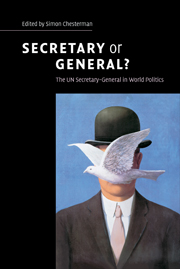Book contents
- Frontmatter
- Contents
- Contributors
- Foreword
- Acknowledgements
- Introduction: secretary or general?
- PART I Defining and refining the job description
- PART II Maintaining peace and security
- PART III Normative and political dilemmas
- PART IV Independence and the future
- 10 The Secretary-General's political space
- 11 The Secretary-General in a unipolar world
- 12 Resolving the contradictions of the office
- APPENDIX: selected documents on the Secretary-General
- Select bibliography
- Index
12 - Resolving the contradictions of the office
Published online by Cambridge University Press: 06 January 2010
- Frontmatter
- Contents
- Contributors
- Foreword
- Acknowledgements
- Introduction: secretary or general?
- PART I Defining and refining the job description
- PART II Maintaining peace and security
- PART III Normative and political dilemmas
- PART IV Independence and the future
- 10 The Secretary-General's political space
- 11 The Secretary-General in a unipolar world
- 12 Resolving the contradictions of the office
- APPENDIX: selected documents on the Secretary-General
- Select bibliography
- Index
Summary
The problems of the Secretary-General are as many as the number of member states of the United Nations. Although the UN Charter merely designates him or her “the chief administrative officer of the Organization” the position, as this volume has shown, is both much more and much less than that. In the vexed, and too often adversarial, relationship of the office to the members of the organization, the Secretary-General is sometimes treated as an errand boy and punching bag. This is partly the fault of short-sighted foreign offices, but also of the contradictions in the way the job is described in the Charter. That instrument seems to establish him or her as an important independent force, but also as a mere servant of the political organs of the organization. The problems that have afflicted the various incumbents mostly result from those contradictory designations.
Yet this is not the only contradiction of the office. Quite apart from whether the Secretary-General is intended to be a secretary or a general, the appointment process is designed to avoid selecting either: it is a political rather than professional process, but one that is geared to choosing the weakest rather than the strongest candidate. This is not to disparage the various incumbents, but, as Brian E. Urquhart recounted in chapter 1, those who have stood tallest in the role have been those who most exceeded expectations.
Even within the two dominant functions of the position, the Secretary-General frequently lacks sufficient internal authority to be an effective administrator of the organization, while also lacking the resources to exercise his or her external functions with credibility.
- Type
- Chapter
- Information
- Secretary or General?The UN Secretary-General in World Politics, pp. 232 - 240Publisher: Cambridge University PressPrint publication year: 2007
- 1
- Cited by



